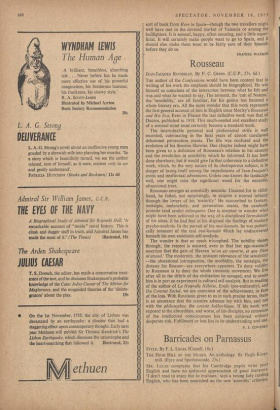Rousseau
JEAN-JACQUES ROUSSEAU. By F. C. Green. (C.U.P., 27s. 6d.)
THE author of the Confessions would have been content that in writing of his work the emphasis should be biographical. He was himself so conscious of the interaction between what he felt and was and what he wanted to say. The torment, the 'cult of Nature,' the 'sensibility,' are all familiar, for his genius has haunted a whole literary era. All the more wonder that this work represents the first general account of him in English since Morley's Rousseau and His Era. Even in France the last definitive work was that of Ducros, published in 1918. This much-needed and excellent study of a seminal mind must certainly become a standard work.
The interminable personal and professional strife is well recorded, culminating in the final years of almost unrelieved delusional persecution mania. The life was confused and the evolution of his theories likewise. One chapter indeed might have been given to a definition of Rousseau's relation to his century and the revolution in sensibility which he informed. It has been done elsewhere; but it would give further coherence to a definitive work, which, by the very nature of its obstreperous subject, is in danger of losing itself among the impedimenta of Jean-Jacques's erotic and intellectual adventures. Unless one knows the landscape well, one might miss the significant wood for the neurotic, obsessional trees.
Rousseau emerges as essentially neurotic. Uncared for in child- hood, he failed, not surprisingly, to acquire a normal infaneY through the lovers of his 'maturity.' He succumbed to fantasy, nostalgia, melancholy, and persecution mania, the casebook juvenile (and senile) delinquent. One is tempted to wonder what might have been achieved in the way of a disciplined formulation of his ideas, if he had had at his disposal the findings of modern psycho-analysis. In the pursuit of his moi-humain. he was patheti- cally innocent of the real moi-humain which lay undiscovered beneath his own assiduous self-analysis.
The wonder is that so much triumphed. The nobility shines through; the respect is assured; even in that last ego-maniacal assertion that the gate of Heaven ',Wen est ouverte, et que Dieu m'attend; The modernity, the insistent relevance of the sensibility —the obsessional introspection, the morbidity, the nostalgia, the distaste for Reason—are everywhere apparent. To deny validitY to Rousseau is to deny the whole romantic movement. We live after all in the debris of the civilisation he savaged, and to assess him is in part an experiment in cultural self-analysis. But in reading of the author of La Nouvelle Heloise, Emile (pre-eminently), and Du Contrat Social, we are conscious of the achievement, in face of the loss. With Rousseau given to us in such precise terms, there is an assurance that the creative advance lay with him, and not with the philosophes, the coterie holbachique. If his work was exposed to the absurdities, and worse, of his disciples, no extension of the intellectual consciousness has been achieved without desperate risk. Fulfilment or loss lies in its understanding and use P. .1. COVENEY










































































 Previous page
Previous page